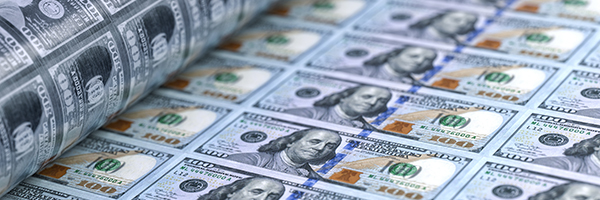Mid Term

April 24, 2025 | Daily JAM, Mid Term |
Unilever (UL) and Nestle (NSRGY) both posted better-than-expected sales in the first quarter. Because they were able to push prices higher to counter surging commodity costs.
That’s not good news for consumers or food-price inflation. Both companies said customers will have to take some of the pain as a global trade war and surging commodity prices lift their costs again.

April 11, 2025 | Daily JAM, Mid Term |
Inflation-linked bonds, TIPS or Treasury Inflation-Protected Securities–are the biggest losers in this month’s Treasury market selloff. The cause of the drop in this market extends beyond damage done by rising inflation expectations. The problem also is a result of a drop in liquidity on the TIPS market. And as such it’s a sign of increasing stress in the financial markets in general. (My YouTube video today is about stress in another are of the system–the growing inability of banks to sell on debt on their books from private-equity buyout deals.)

April 11, 2025 | Daily JAM, Mid Term |
The latest University of Michigan consumer sentiment survey released Friday showed sentiment hitting its lowest level since June 2022. The index slid to a reading of 50.8, below the 57 seen last month and the 53.8 expected by economists.
Pessimism about inflation outlook soared again, as one-year inflation expectations jumped to 6.7%–the highest since 1981-—from 4.9% the prior month.

March 25, 2025 | Daily JAM, Mid Term |
Credit rating company, Moody’s Investors Service, one of the three big debt ratio companies, warned on Tuesday that President Donald Trump’s trade tariffs could hamper the country’s ability to cope with a growing debt pile and higher interest rates. The rating agency said that America’s “fiscal strength is on course for a continued multiyear decline”, having already “deteriorated further” since it assigned a negative outlook to America’s Aaa credit rating in November 2023.

March 23, 2025 | Daily JAM, Jubak Picks, Long Term, Mid Term, Stock Alerts, TCEHY, Top 50 Stocks, Volatility |
On Monday, March 24, I’m adding these Tencent ADRs (TCEHY) TO my Jubak Picks and Volatility Portfolios.

March 14, 2025 | Daily JAM, Mid Term |
To subscribe to JAM you need to fill in some details below including, ahem, some info on how you'll pay us. A subscription is $199 (although if you're subscribing with one of our special offers it will be lower) for a year for ongoing and continuing access to the...

March 14, 2025 | AAPL, Daily JAM, Mid Term, Videos |
Today’s Quick Pick is Apple (AAPL). This is a short term buy or, if you own it, a “get ready to sell.” Apple’s Worldwide Developers Conference happens in early May, and the stock usually gets a bounce from new product and technology announcements. This year we’re likely to hear more on AI. Apple’s stock hasn’t performed all that well lately, and I don’t want to hold the stock after the expected pop from the conference and new product releases in the fall. I worry about the long term choices the company is making. Apple has decided not to offer a low-price, affordable introductory iPhone as a gateway to their suite of products. They’ve effectively ceded the lower end of the market to other players–especially in China. They’ve also just announced that the AI add-ons to Siri they promised have been delayed and it’s unclear when they’ll be available. Apple is lagging in AI as other companies race ahead. We can expect disappointing sales in December–particularly out of China. I don’t want to hold on to the stock at the end of the year and I’m looking to sell on a bounce after the conference and new product launches in September.

March 10, 2025 | Daily JAM, Mid Term, Morning Briefing |
We haven’t had a really severe bout of stagflation since the late 1970s and early 1980s–but suddenly that scenario of very slow growth with high unemployment but with high inflation too that prevents the Federal Reserve from just cutting interest rates get growth back on track is back on Wall Street’s worry list.
And really serious stagflation would be something to worry about. In 1980–just before the Federal Reserve created a deep recession and bear market to break the back of stagflation–inflation hit almost 14.5 and unemployment reached 7.5%

March 7, 2025 | AAPL, AMZN, Daily JAM, Mid Term, Top 50 Stocks |
Apple (AAPL) has confirmed that it’s delaying the release of a new AI Siri digital assistant. The company now expects to roll out the software sometime “in the coming year.” The effort will give Siri “more awareness of your personal context, as well as the ability to take action for you within and across your apps,” the iPhone maker said in a statement. “It’s going to take us longer than we thought to deliver on these features.” Apple’s struggles to finish the new AI capability for Siri has been a one secret for the last month or so after Bloomberg’s Mark Gurman reported on the delay. The Siri AI features were first touted in June 2024 at the company’s Worldwide Developers Conference. When Apple announced the features at WWDC, it didn’t provide an arrival date for the Siri upgrade, Gurman reported. Within the company, though, the plan was to include the new technology in iOS 18.4, which comes out in April.

March 5, 2025 | Daily JAM, Mid Term, Morning Briefing |
The odds of a U.S. recession are still low, but an increasing number of Wall Street economic models say the odds are climbing.

February 27, 2025 | Daily JAM, Mid Term, Morning Briefing |
After sowing confusion with remarks at Wednesday’s cabinet meeting that seemed to postpone new, higher tariffs on goods from Canada, Mexico, and China to April, today President Donald Trump said 25% tariffs on Canada and Mexico are on track to go into place on March 4, and said he would impose an additional 10% tax on Chinese imports.

February 25, 2025 | Daily JAM, Mid Term, Morning Briefing |
The Conference Board’s measure of consumer confidence fell this month by the most since August 2021. The Conference Board’s index fell 7 points in February to 98.3, marking the third straight decline, data released Tuesday showed. The figure was below all estimates in a Bloomberg survey of economists. A measure of expectations for the next six months also fell by the most in three-and-a-half years, while a gauge of present conditions declined more modestly.













